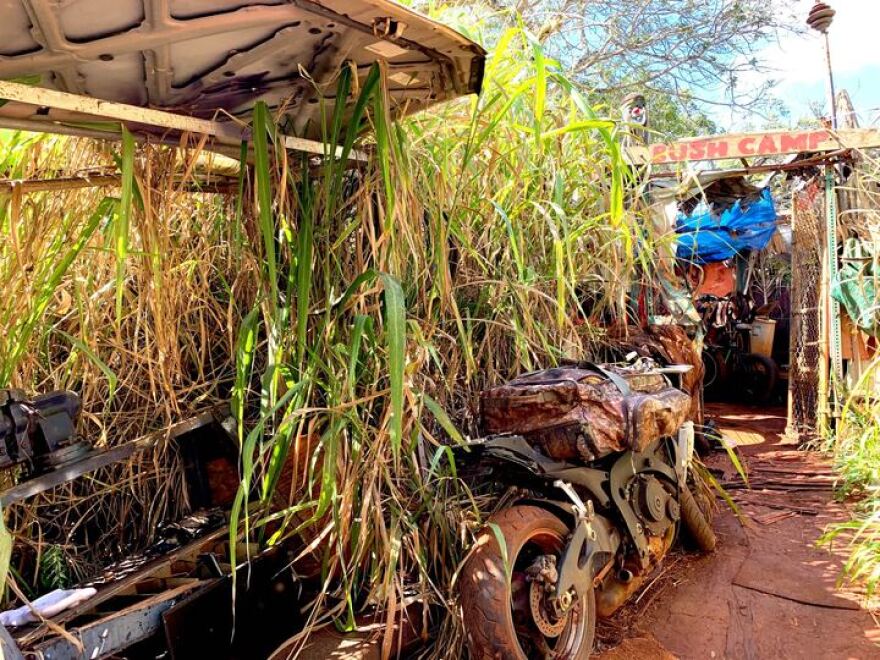COVID-19 infections at O'ahu's homeless shelters are putting more pressure on Honolulu's street population. HPD enforcements continue as options for safe shelter are decreasing. Encampments in Waimanalo and Waianae are being allowed to remain, while mobile testing on the street gets increased attention.

State and private entities like Premiere Medical Group have been leading COVID-19 testing efforts on O'ahu, and community health centers are ramping up capabilities.
At the same time, Project Vision has been tapped to offer mobile testing for Honolulu's homeless.
Project Vision's Executive Director Darrah Kauhane says, as a private nonprofit, her group is probably doing the majority of testing for the homeless community all over O'ahu.
"We've screened thousands, I'd say we've tested near 750. We've done a lot of work on the east side with Waimanalo Health Center, we've done a lot of work in town with the big agencies like IHS. We've been out on the west side working with vets."
Project Vision expanded from vision care to comprehensive health, hygiene and social services after COVID started. They have a rotation of sites at which they have now provide expanded services. They are not doing mass testing on the street.
"We work through Partners in Care, the Continuum of Care. If they identify an individual that has symptoms or if they identify a group of clusters where there's a lot of people living together and maybe not necessarily getting the hygiene services they need, especially due to parks being closed and bathrooms being closed at one point in the parks and in the beach parks."
Partners in Care Executive Director Laura Thielen says both homeless and service providers are on notice they could be cited in those locations.
"So they have all been notified that if they do go try and provide services," says Thielen. "If they are approached by HPD, they will probably be cited."
Parks and beach parks are closed on O'ahu, and Chief Susan Ballard says HPD will continue to enforce City laws and orders, despite CDC guidance discouraging movement of homeless populations “if individual housing options are not available.”
City Housing Director Marc Alexander says CDC guidance does not carry the force of law, and while encampments at Waimanalo and Wai'anae are continuing by arrangement, enforcements continue throughout Honolulu.
"Other areas we've had to enforce because they are not keeping physical distancing, they are not wearing masks, they're impeding public movement which is not fair to the public and dangerous to themselves and to the public. So we try to balance this, and we work with the outreach teams, HPD of course, and PIC, Partners in Care."
PIC Executive Director Thielen says last week, service providers were warned by HPD but she does know of any receiving citations. Homeless, on the other hand, continue to receive multiple tickets.
"Most of these citations that have been given out over the last several months, have been basically thrown out," says Thielen. "Not only is it a waste of time, more importantly, right now, if we come in contact with somebody and we know they're at high risk for contracting Covid, and then they're swept, we may not be able to find them again."
State-run parks and beaches are also closed, but disruptions to homeless have been suspended according to State Homeless Coordinator Scott Morishige.
Morishige says, while clearing parks and beaches may have made O'ahu's homeless more visible, placements in more permanent housing have continued, and are among two primary objectives.
"Partners in Care has this landlord engagement program where they're reaching out to realtors, landlords, property managers, building up this inventory of units and as these increased federal resources come online, ideally we'll be able to pair the subsidies that come in through these federal programs with the housing inventory Partners in Care is identifying. That's one thing."
Morishige identified a second priority, building and delivering mental health services. These efforts, he says must be undertaken now, as continuity of state funding is far from assured.
Late Monday, August 24, Kauhane of Project Vision confirmed COVID positive cases have been found among O'ahu's homeless. They are currently isolating at DOH locations.




